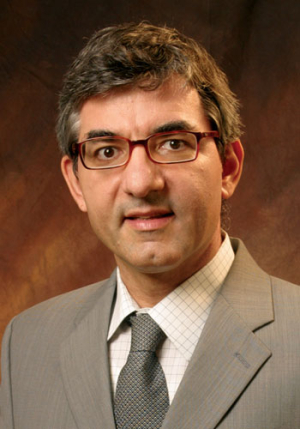Much of Demetre Economou’s career has been spent ahead of the curve.
He’s led the research world in atomic layer etching and developed a promising nanofabrication technique expected to give researchers the ability to mass-produce nanotech devices.
His ideas related to gas plasmas and their application to the fields of microelectronics and nanotechnology have been published in both nationally and internationally known scientific journals with the results of his research impacting everything from microchip manufacturing to the design of plasma television panels.
As an educator, this John and Rebecca Moores Professor of Chemical and Biomolecular Engineering has gone above and beyond to help his students succeed. He keeps an open door policy always encouraging of questions and in the classroom, actively engages students with real-world examples that work to solidify textbook theory.
This influence is why he was named the 31st recipient of the Esther Farfel Award, the highest honor given by the University of Houston.
A symbol of overall career excellence, the Esther Farfel Award not only recognizes a tenured faculty member’s teaching and research impact, but also their service contributions. It carries with it a $10,000 monetary gift.
“When I found out I got the award I actually went through the list of people who received it in the past,” said Economou, pointing out past recipients that included his chemical engineering colleagues, Neal Amundson’s and Dan Luss. “It feels really good to be added to a list with these people.”
His announcement as the 2009 recipient makes him the sixth professor from the college to be bestowed with the prestigious honor, a fact not lost on Cullen College of Engineering Dean JosephTedesco.
“We are very proud of Demetre for representing the Cullen College of Engineering through this award,” said Tedesco. “The honor exemplifies the core mission of the college, to serve the educational needs of our community while conducting pioneering research in areas of national interest.”
Economou joined the university in 1986 as an assistant professor in the college’s department of chemical and biomolecular engineering. Since this time, he has found countless ways to give back to the campus community not only as an educator, but also as a member of more than a dozen committees at the department, college and university levels.
He is serving on program and advisory committees for six international conferences and has been a guest editor for several top notch, internationally circulated scientific journals.
In 1995 he began work as associate chair of the department, a post he still holds today. In this role, he is responsible for advising the department’s freshman and sophomore students—near 250 in total.
Aside from administrative work and service-oriented commitments, Economou still manages to remain an innovator in his field, and has garnered 48 grants totaling more than $7 million to do so.
These have helped fuel research to further everything from the manufacturing of microelectronic devices to developments in the field of nanotechnology.
This funding is what has helped him make his international reputation in plasma processing, according to Mark J. Kushner, George I. Haddad Collegiate Professor at the University of Michigan and director of the Michigan Institute for Plasma Science and Engineering.
“An excellent example (of his contributions) is Professor Ecomomou’s investigations of ion-ion plasmas,” said Kushner. “This is a class of pulsed plasmas now used in industry, in large part due to his contributions, to minimize the charging damage of microelectronic devices during plasma etching. Professor Economou, through his modeling and experimental investigations, established the knowledge base required to both understand and apply these important systems to microelectronics fabrication. Many of our highest performing microprocessors may not have been possible in the absence of the processes he developed.”
Many of Economou’s colleagues will tell you, he is proof great researchers can be great teachers. In his 23 years as an educator, he has influenced many that have walked through his classroom doors.
“Demetre has far exceeded any definition of excellence in teaching,” said Eray Aydil (1991 Ph.D. ChE) now a professor in the Department of Chemical Engineering and Materials Science at the University of Minnesota. “I was a teaching assistant in many of his classes and I still remember his lucid, entertaining and information-packed lectures. He has set, for all of us, the highest scientific and ethical standards and I for one always go back to those ‘teaching moments’ we have had together whenever I face a tough critical decision, and use what I learned from Demetre to guide me.”
At the university, this passion to mentor has been recognized many times with honors that include the college’s Outstanding Teaching Award, the University of Houston’s 2008 Excellence in Research and Scholarship Award as well as the Fluor-Daniel Award, the highest given by the college.
His ability to keep students excited about chemical engineering and his unwavering support for the university leave him well respected among his peers.
“Demetre Economou is an excellent choice for the highest award given to faculty at the University of Houston,” said Dave Shattuck, associate dean for undergraduate programs at the Cullen College. “He has an unusual combination of excellence in all three of the roles of faculty member. He is a top-flight teacher. He is an internationally recognized researcher who has produced an amazing array of graduates, now serving in high positions. On top of this, he has contributed high quality administrative service to his department and his college, well beyond that contributed by the typical faculty member.”
